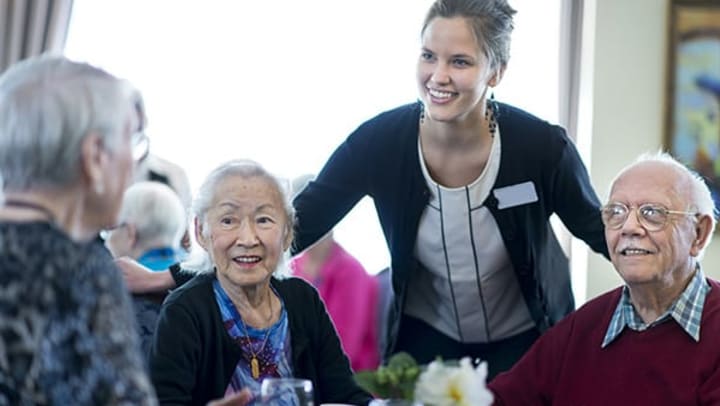When comparing senior living options around Texas or Oklahoma, and distinguishing between the types of care and services available, you should first realize the vital role that relationships play in being healthier and happier – and living longer. In fact, years of research show that senior living residents who uphold positive relationships feel more fulfilled and enjoy a greater sense of belonging and of being valued contributors to their community.
Come along with us for our Relationship-Centered Living Series, continuing over the coming weeks, as we talk in greater detail about relationship-centered living and its significance for seniors. To kick it off, we’ll answer some common questions, starting with the key benefits of this lifestyle and a summary of the “Pillars of Well-Being” needed for people and communities to thrive.
What Does Relationship-Centered Living Mean?
Defining relationship-centered living is actually quite easy: It means living life with relationships at the center of everything. Regardless of age, this practical, research-based and science-backed philosophy rewards people with increased well-being. At its heart, relationship-centered living revolves around caring relationships and intentional connection with those people we interact with often.
How Can I Identify Relationship-Centered Living?
It might be tricky to know if a community implements a relationship-focused approach. For older adults residing in independent living communities, assisted living communities, memory care communities, life plan communities and other community settings, you’ll recognize it by certain, beneficial characteristics. A relationship-centered senior living community:
1. Emphasizes residents' value and unique contributions
These communities celebrate residents for who they are and encourage them to share their stories and achievements. Treated with the highest level of respect and dignity, and tapping into their relationships, residents apply their interests, talents, ideas and experience to enhance community life. They actively get involved in the community and provide feedback and opinions. For instance, you’ll notice that they serve on resident council boards, participate in annual surveys, offer insight that enhances life enrichment programs and more.
2. Keeps partnerships between residents, family members, staff and the overall community strong and active.
Look for exceptional relationships among the staff – or team members – as they will affect the quality of life that residents experience. Likewise, you can anticipate that team members who cultivate great relationships with family members will develop trust and ensure the highest standards of excellence in service and care. And if a senior living community team strives to foster relationships with community practitioners, they’ll use this collaboration to advocate for residents in many meaningful ways.
3. Evokes a genuine sense of family.
Consider the positive relationships you share within your own family. What are some of the traits that make them so wonderful? Certainly, love, patience, cooperation, belonging and fun. In a relationship-centered setting, team members will embrace those same traits. They commit to creating close bonds with residents and truly get to know them and their needs. Similar to a family, the understanding that we need and that we have each other boosts us on both our best and worst days. When they encounter challenges, residents feel grateful for the support of people displaying compassion, empathy and expertise. Plus, moments of terrific joy and celebration become even more memorable, since they are spent together.
4. Connects residents with a network of friends.
Some older adults find it daunting to reach out, make friends and maintain relationships – but doing so is crucial for their well-being. Suzanne Degges-White, Ph.D. states in Psychology Today that, “To thrive in an increasingly isolating world, it’s helpful to have connections with others that reflect varying degrees of closeness.” Her article discusses the seven basic friendships that give value to our lives and why social connections are essential to our happiness. Further, “It’s important to cultivate a multi-faceted network of friendships,” she writes.
Fortunately, a senior living community provides an abundance of opportunities to forge friendships – casual to close – every single day. Just think: Right in their own home surroundings, seniors can interact with next-door neighbors, dining room tablemates, exercise classmates, numerous other fellow residents, team members, volunteers and guests.
What Should I NOT Expect from Relationship-Centered Living?
For all the many, beneficial things that relationship-centered living IS, there are also good things it IS NOT. As an example, being dubbed “relationship-centered living” might give the impression that every instant will be spent interacting. However, in opting for this approach:
- DO NOT feel pressured to be the most gregarious person around. Openness and sociability are great, but there’s no need to be the life of the party.
- DO NOT assume you’re sacrificing privacy. You can always retreat to your personal space whenever you want.
- DO NOT think you can’t enjoy life without being around other people constantly.
Instead, the goal of relationship-centered living is to give seniors those significant opportunities to create healthy connection and ideal well-being. You remain in charge of how to make the best use of your time.
How Do You Correlate Relationship-Centered Living with Overall Well-Being?
Naturally, relationships bear a major impact on both individual and community well-being. Research shows us that those who demonstrate high levels of well-being are likely to be happier, healthier and more productive. In order to achieve our organization-wide goals, the Cardinal Bay team has established these multidimensional components essential to flourishing people and communities.
We deliver our excellent standards for relationship-centered living by applying these “5 Pillars of Well-Being”:
- Relationships
- Health
- Mindset
- Spirit
- Purpose
At Cardinal Bay, we are devoted to integrating these benchmarks into each facet of life, in every one of our senior communities.
In the coming weeks, we’ll present more chapters of our Relationship-Centered Living Series, to take a closer look at all of these pillars and keep discussing just how critical it is for older adults to foster ongoing relationships.
Count on a First-Class Senior Living Expert
If you or your loved one could benefit from a supportive “village,” it may be time to consider senior living options in your area. Cardinal Bay provides independent living, assisted living and memory care communities in Texas and Oklahoma. In a highly social, relationship-centered environment, our residents experience a wealth of stimulating activities, ultimately leading to healthier, richer and more fulfilling lives.
Be sure to tour the communities you like, and speak with staff members and residents to guarantee you have all the vital information in hand to make the best decision.


